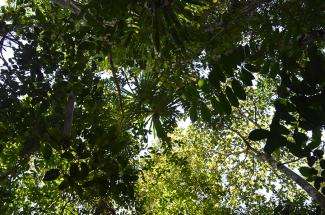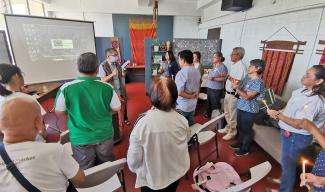Low Carbon Land Use and Forestry Development in Papua and West Papua Provinces
Posting Date
Papua and West Papua's 41 million ha of forests comprise almost 36% of remaining forests in Indonesia. In 2012, the provincial governments of both provinces developed strategies and action plans to reduce emissions from deforestation and degradation (REDD+). This was followed in 2013 by the development of provincial action plans for green house gas (GHG) emissions reduction.
In 2013 Samdhana, supported Papua State University to conduct a one-day workshop on institutional preparation for implementing the provincial strategy and action plan in Tambraw District, the first conservation district in West Papua Province. Low carbon development and REDD+-related work were also included in the agenda.
Samdhana, informed by specific discussions and field visits pertaining to low carbon development, supported Papua's Low Carbon Development Task Force in analyzing the potential for low carbon projects in Forest Management Units (KPHs).
Activities in 2014 continue to build upon the ideas and action plan developed over the course of the last two years. With the legal establishment of the National REDD+ Agency at the end of 2013, both Papua and West Papua Provinces will move to propose their own projects plans. The KPH has been put forward as the locus of action. Local MRV (monitoring, reporting and verification), performance indicators and criteria will also be developed to enable emission reductions and ensure that local stakeholders realize the benefits.
In Biak, one of the first models for KPHs in Papua Province has proposed community-based reforestation for implementation. The target area is the “marires†land that covers almost 30% of the eastern portion of Biak's forest. The proposed project will be conducted by the KPH, in collaboration with the Papua Low Carbon Development Task Force. The work will begin with identifying suitable species for planting, and mapping the areas to be reforested. This process will be supported by Papua State University. In addition to having proven an effective partnership, continued collaboration between the university and Samdhana is also providing field research and sustainable forest management opportunities for a new generation of Papuan foresters.
With respect to readiness for REDD+, the experience of Samdhana and partners demonstrates the importance of secure land rights and active participation of the community. Beyond Samdhana's ongoing efforts, the REDD+ project pipeline through the REDD+ Agency (BP REDD+) should include community participation as a core principle and customary boundary mapping as a prerequisite for launching projects.
In 2013 Samdhana, supported Papua State University to conduct a one-day workshop on institutional preparation for implementing the provincial strategy and action plan in Tambraw District, the first conservation district in West Papua Province. Low carbon development and REDD+-related work were also included in the agenda.
Samdhana, informed by specific discussions and field visits pertaining to low carbon development, supported Papua's Low Carbon Development Task Force in analyzing the potential for low carbon projects in Forest Management Units (KPHs).
Activities in 2014 continue to build upon the ideas and action plan developed over the course of the last two years. With the legal establishment of the National REDD+ Agency at the end of 2013, both Papua and West Papua Provinces will move to propose their own projects plans. The KPH has been put forward as the locus of action. Local MRV (monitoring, reporting and verification), performance indicators and criteria will also be developed to enable emission reductions and ensure that local stakeholders realize the benefits.
In Biak, one of the first models for KPHs in Papua Province has proposed community-based reforestation for implementation. The target area is the “marires†land that covers almost 30% of the eastern portion of Biak's forest. The proposed project will be conducted by the KPH, in collaboration with the Papua Low Carbon Development Task Force. The work will begin with identifying suitable species for planting, and mapping the areas to be reforested. This process will be supported by Papua State University. In addition to having proven an effective partnership, continued collaboration between the university and Samdhana is also providing field research and sustainable forest management opportunities for a new generation of Papuan foresters.
With respect to readiness for REDD+, the experience of Samdhana and partners demonstrates the importance of secure land rights and active participation of the community. Beyond Samdhana's ongoing efforts, the REDD+ project pipeline through the REDD+ Agency (BP REDD+) should include community participation as a core principle and customary boundary mapping as a prerequisite for launching projects.




